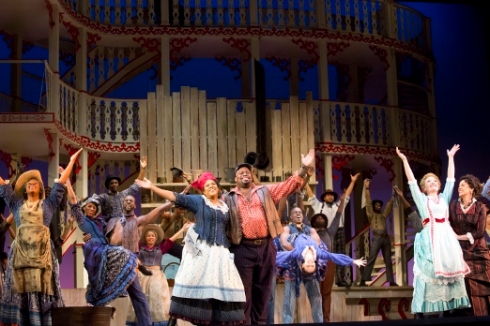By JOHN DeMERS
At first blush, Showboat seems one of those artifacts of the Old South that neither deserves nor is likely to be heard again – a Song of the South without benefit of cuddly animated animals. Yet as happens so often in opera and/or musical theater, great music and a loving heart lift it above dozens of similar works to give us a gift that glimpses the eternal.
Last night, at the opening of Houston Grand Opera’s dazzling new co-production, anybody with a brain and especially with a heart could step through the visions of “darkies” on the Mississippi to sense the same metaphors that always inspired Mark Twain – not to mention the work’s single grandest song, “Ol’ Man River.” The production turns a deft hand to all the best and worst impulses from our shared history, to inspire rather than offend. As the company that, in the late 20th century, gave perfect pitch to both Gershwin’s Porgy and Bess and Joplin’s Treemonisha, HGO is the only opera company I want singin’ and dancin’ on the levee.
So rather than quibble, let’s simply state: Showboat was not written as an opera. Unlike either of those two other works, it was in no way a lofty aspiration to show the world (meaning Europe) that America could produce “grand opera.” It was written as a Broadway musical – even worse, a Broadway musical in an age that tossed out frothy stage shows (and also movies) that no one should ever stage or have to watch again. Yet with music by Jerome Kern and lyrics by Oscar Hammerstein II – before he found Richard Rodgers and changed the world – the entertainment product called Showboat was, and still is, as good as the genre can get.
What’s intriguing here, even after film versions in the 1930s and the 1950s, is what a full-on opera production brings to this tale. First and foremost, it brings a much larger orchestra than any Broadway show is likely to have, which in turn gives us shimmering rollercoasters of glorious sound. As conducted by HGO artistic and music director Patrick Summers, the orchestra never sounded better with Verdi, Mozart or Wagner than it does with Kern. On many numbers, filled with hip-swaying, jazz-tinged, almost-New Orleans rhythms, Summers looks like he’s having the time of his life.
And then there are those “opera voices.” While not always a fan of the “Birgit Nilsson Sings Harry Nilsson” style of crossover album (and yes, I made that one up), I admit that many of Kern’s best numbers in Showboat take on new dimensions when baptized with opera. The love duets “Make Believe” and “You Are Love” achieve a ringing intensity seldom heard, since love duets are one of the things opera does best. The torch-song anthems “Can’t Help Lovin’ Dat Man” and “Bill” keep their breathy splendor while reaching musically toward something a bit more highbrow. And yes, of course… “Ol’ Man River” allows very bass Morris Robinson as the typically first-name-only “Joe” to bring down the house whenever nobody else is singing something.
The cast assembled by HGO (mostly opera singers, except for one guy with Dr. Frank’N’Furter in The Rocky Horror Show among his credits) is first-rate. Soprano Melody Moore is terrific as Julie, the tragic mixed-blooded figure who disappears oddly in Act II but leaves a huge impression of sadness whenever she’s around, as is mezzo Sasha Cooke as the young woman named Magnolia. Early on, in fact, I found Cooke’s full, mature voice inappropriate to what seemed an ingénue, but as many years pass during the show’s narrative, you might say the character grows into the voice. Tenor Joseph Kaiser shines as bounder-with-a-heart-of-gold-and-ridiculous-name Gaylord Ravenal, and so does Lara Teeter in the lovably high-energy comic role of Cap’n Andy, Magnolia’s father and master of the Cotton Blossom.
Every aspect of this production is as lovely to look at as it is to hear: the sets by Peter J. Davison, the decades’ worth of historical costumes by Paul Tazewell, the luminous lighting (more along the Mississippi in Act I than in Chicago in Act II) by Mark McCullough and the deliciously folk-inspired choreography by Michele Lynch. For once with an HGO production, dancing is one of the highlights, borrowing moves from all sorts of African and African-American traditions. As director, Francesca Zambello does a marvelous job of keeping things moving – indeed capturing the intimacy over great chasms that blacks and whites often experienced in the Old South. She understands deeply the interplay of light and dark, the shifting emotions of love and loss, that mark our time here set against the river’s timelessness.
HGO Photo by Felix Sanchez

Leave a comment